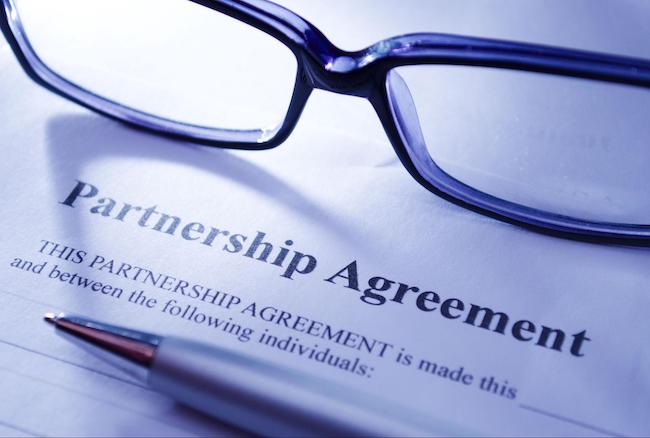If you’re considering forming a business, you probably have a lot on your to-do list. You’ve got to make sure your business idea is concrete, create a solid business plan and come up with a memorable name. Luckily, if you’re considering starting a business with someone else, you won’t have to do it all alone.
Your business structure is one of the first things you’ll need to work out together. Naturally, you might be inclined to choose a partnership structure, but the UK has three main business structures. Sole traders are the most popular structure, with 56% of UK businesses being sole proprietorships and limited companies not too far behind with 37%. Surprisingly, business partnerships only make up 7% of UK businesses.
Each structure has distinct advantages and disadvantages, and it can be tricky to determine which is right for your business. Luckily for you, Mint Formations have got you covered.
We’ve compiled this complete guide to business partnerships so you can decide if it’s the best option. It has everything you need to know, including an overview of business partnerships, different types of partnerships and their pros and cons. Plus, we’ve included a step-by-step guide on how to set up a business partnership.
Ready to get stuck in?
What is a Business Partnership?

Put simply, a business partnership in the UK is a legal business structure where two or more people set up a business and run it together. Usually, each partner will invest money, contribute industry knowledge and skills, as well as share the business’ profits and losses.
Partnerships are often formed to combine skill sets and resources to bring a business idea to life. By combining experience and expertise, partners can build a business that is stronger than if they started alone.
Types of Business Partnership
There are three types of business partnerships in the UK, general, limited and limited liability partnerships. Here’s a quick overview of each of them:
General Partnership
A general or ordinary partnership is the most common form of partnership, where two or more partners come together to form and run a business. Generally, each partner shares responsibility for the management and finances of the business and shares profits and losses equally unless the partnership agreement states otherwise.
In a general partnership, each partner has unlimited personal liability for any business debts or obligations. This means that if the business cannot pay its debts or is sued by a customer, the partners’ personal assets can be used for payment. A general partnership is not a separate legal entity, meaning each partner must pay income tax and National Insurance contributions individually through HMRC’s self-assessment tax.
Limited Partnership (LP)
Limited partnerships work similarly to general partnerships but give some partners more protection in terms of liability. In a limited partnership, there are two types of partners, general partners and limited partners, which have the following distinctions:
- General partners have the same liability as in a general partnership — for example, unlimited personal liability.
- Limited partners have limited liability and are only liable for the amount they invest in the business.
As with a general partnership, each partner pays tax and National Insurance contributions individually.
Limited Liability Partnership (LLP)
Despite the name, limited liability partnerships are not technically a partnership. LLPs are more of a hybrid between a partnership and a limited company. In an LLP, each partner has limited liability for any business debts or obligations, and the business is taxed as a separate legal entity. LLPs require a nominated partner to complete and submit the company tax return to HMRC.
While the business is taxed separately, partners must file their own tax returns and pay income tax and National Insurance contributions individually.
Advantages of Forming a Business Partnership

When choosing your business structure, it’s essential to understand the benefits of starting one form of business over another. Why form a partnership when you could start a limited company? The good news is that a business partnership offers you and your partners many advantages.
Let’s highlight some of the most significant benefits of setting up a partnership.
Shared Workload and Responsibilities
When you start a business on your own, you’ll be solely responsible for the running of the business. That means you’ll need to take on every task and responsibility yourself. You’ll be accountable for everything from accounts, marketing and sales to product development and customer service. Even if you outsource some of the work, you’ll still need to research who to work with and manage it.
All in all, it’s a lot of work.
But if you start a business with a partner, you can share the workload and divide responsibilities. This can be a big help for both you and your business. By sharing the load, you can be more productive, less stressed and avoid burnout.
Shared Financial Resources
Unsurprisingly, starting a business can be an expensive endeavour. In the early stages of any business, investment is required to get it off the ground. In the UK, the average cost of starting a business is £5000, so even if you’re running a business with relatively low overheads, you’ll still need some capital to start. Unfortunately, not everyone has the financial resources to do this alone.
This is where partnerships really shine. By forming a business partnership, you can pool your financial resources and invest more in the business. Having more money available when you start your business gives you more opportunities to grow and increases your chance of success. Plus, you can share the financial risk, which is particularly beneficial for new start-ups.
Different Skill Sets and Expertise
Running a business requires a wide range of skills if you want your company to succeed. Beyond providing top-notch products and services to your customers, you’ll need to handle finances, marketing and operations. That’s a lot to handle on your own.
The good news is that everyone has a unique set of skills, and by forming a partnership, you can make the most of each other’s skill sets. Say, for example, you’ve got extensive knowledge about marketing and branding, but you’ve not had much experience handling business management and finances. You can partner with some with skills in those areas. Combining your talents and expertise allows you to set yourself up for success rather than spreading yourself too thin.
Ability to Take On Larger Projects
As a business owner, the last thing you want to do is miss out on opportunities. But one of the biggest obstacles when you run a business on your own is the workload. Company founders often spend between 60 and 100 hours working when they’re starting a business to ensure the company succeeds.
But when you’ve only got one set of hands, you can easily miss out on significant opportunities by not having the capacity to handle them. By combining your skills with your partners’, you’ll be much better equipped to take on larger projects and not miss growth opportunities.
Potential Disadvantages of Forming a Business Partnership

While setting up a business partnership offers many benefits, there are also potential disadvantages. Before you decide that a partnership structure is right for you, it’s essential to be aware of some potential drawbacks. Here are some of the most significant ones to consider:
Potential for Conflict and Disagreements
When more than one person is involved in running a business, there’s always room for potential disagreements or conflict. When you start your new business, you and the other partners may be on the same page about everything, but as time goes on, disputes can arise. These disagreements could be about a range of issues, including:
- How the business is run
- How to allocate or reinvest profits
- How to deal with challenges.
While disagreements are perfectly natural and can lead to compromises, they can cause a breakdown of the partnership.
Difficulty in Dissolving the Partnership
Speaking of the breakdown of the partnership, ending a business partnership can be a complex process. If you’re just starting to think about forming a business, it’s unlikely that you’ve considered ending it, but it’s an important consideration. If you decide to dissolve the partnership in the future, you’ll need to agree on how to divide the business’s assets, including:
- Intellectual property
- Clients
- Revenue.
Alongside assets, you’ll also need to settle any outstanding debts or obligations to creditors and HMRC before you can dissolve the partnership.
Loss of Control:
If you’re the director of a limited company or a sole trader, you have almost total control over how your business runs. When you’re a partner in a business, that’s not the case, and you’re not the sole decision-maker. Any business decisions you make will need to be in agreement with the other partners.
While in most cases, you’ll be able to find an agreeable compromise if you disagree, finding the middle ground can sometimes be tricky. In some cases, this can lead to tension, power struggles and the risk of losing control of the business’s direction.
Imbalance of Power
Another significant problem with a business partnership is the potential for an imbalance of power. This is often the case when one partner has more money, resources or expertise than others.
This imbalance can affect the decision-making process and lead to disputes about the direction of the business. It can also lead to one partner feeling undervalued and the other feeling overworked, which can put the partnership at risk.
The good news is that many potential partnership problems can be easily overcome with proper planning. When you form a partnership, you should discuss how you will communicate and solve problems together.
One of the best ways to avoid problems down the line is to create a partnership agreement from the outset that outlines how you will work and run your business together.
How to Start a Business Partnership in 5 Steps

Now that you’re up to speed with the different types of business partnerships and their advantages and disadvantages, you can decide if it’s the right business structure for you.
If it is, you can start to set up your partnership.
Starting a business partnership in the UK is relatively easy. But there are some essential steps you’ll need to take to set your business up for success and ensure you’re legally compliant. Here’s how you do it:
Step 1: Choose Your Business Partners
Unsurprisingly, the first step in starting a business partnership is to choose your partner(s). If you’re already considering a partnership, you’ve probably already got people in mind, but if not, there are some things to look out for in partners.
Try to find people who share your vision, work ethic and goals but are also people you enjoy spending time and working with. You’ll also need to find partners willing to share the business’s responsibilities, risks and profits.
If you can, find partners whose skills complement your own. By choosing partners with different skills and experience, you can ensure you’re covering more key business areas.
Step 2: Pick a Partnership Structure
Once you’ve picked your partners, you’ll need to choose which kind of business partnership you want to form. As we’ve already covered, there are three options:
- General partnership
- Limited partnership
- Limited liability partnership.
Take your time selecting your structure, as it will impact how you register your business, pay taxes and run it.
Step 3: Decide on a Business Name
Once you’ve chosen your partners and structure, you’ll need to pick a business name. When choosing a name, you must keep both Companies House’s naming restrictions and your target audience in mind.
In terms of Companies House restrictions, your name needs to be:
- Unique
- Not similar to an existing company’s name
- Inoffensive.
You can check whether a business name is already registered with Companies House using our company name checker.
Coming up with a name that suits your target audience is a little trickier, but it’s well worth taking the time to pick the perfect business name. Try to pick a name that’s:
- Short
- Memorable
- Easy to spell.
Read our guide on how to pick the perfect business name.
Step 4: Create a Partnership Agreement
Before you start designing logos and your company website, you should take the time to create a partnership agreement with the other partners. A partnership agreement is a legal document that outlines the terms of your partnership. It covers a wide range of issues, including:
- How you’ll run the business together
- How profits and losses will be divided
- What happens if a partner leaves the business.
While there’s no legal requirement for partnerships to have an agreement in place, we highly recommend creating one. By starting out with an agreement in place, you can avoid potential conflicts and disputes in the future.
Step 5: Register Your Partnership
The final step before you can conquer the world with your new business is to register your partnership. How you register your partnership will depend on the partnership structure you have chosen. Here’s a quick overview of how to register each structure:
- General partnership — You’ll need to register your general partnership with HMRC. You can do this online; you only need a business name and a nominated partner. Your nominated partner will be the person who is responsible for HMRC correspondence and compliance.
- Limited partnership — Registering a limited partnership is a little more complicated than a general partnership but still straightforward. You’ll need to register your business with Companies House and supply them with a business name, registered office address and a list of general and limited partners. You’ll also need to pay a small fee.
- Limited liability partnership — Again, registering a limited liability partnership is a little more complicated as Companies House requires more information. To register, you’ll need to supply your business name, registered office address, the details of two or more designated members and an LLP agreement.
Many businesses register their partnership using a formations company like Mint Formations to ensure the correct registration. This way, they can be confident that HMRC or Companies House receive everything they need for a successful registration.
Set Up a Business Today with Mint Formations
So there you have it, everything you need to know about business partnerships — from the very basics through to registering with HMRC and Companies House. By this point, you should be reasonably sure whether a partnership is the right structure for your business.
If you’re ready to get your business partnership off the ground, Mint Formations are here to help. We can help you register your limited liability partnership today for as little as £34 +VAT. Our formations experts will handle everything for you and ensure you’re set up for success.
If you’re unsure that a partnership is the right fit for your business, we’re here to help. We can help you to register a limited company or as a sole trader instead, or if you’d like to speak to an expert before deciding, you can contact the team today.
Explore Mint Formations company formation options today and find the right one for your business. If you have any questions, get in touch with the Mint Formations team today to discuss your options and find the best solution for your business.

